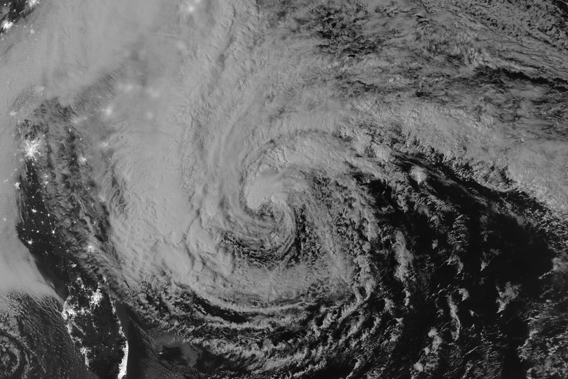
Hurricane Sandy last night over Georgia and Florida. Photo by: NASA.
Mr. Jeremy Grantham, co-chair of the Grantham Foundation for the Protection of the Environment and co-founder and chief investment strategist at GMO, published an online column November 14, 2012 in Nature asking scientists to speak out forcefully, publicly and directly on strategies to mitigate climate change. Mr. Grantham’s column titled Be persuasive. Be brave. Be arrested (if necessary) is a clear clarion call for action. As a fellow natural resources scientist, I agree with Mr. Grantham’s intent.
His column concludes with: “It is crucial that scientists take more career risks and sound a more realistic, more desperate, note on the global-warming problem.”
Yet I as a fellow banker and institutional money manager, I also equally would like Mr. Grantham to ask our fellow banking colleagues to engage publicly, directly and forcefully on strategies and solutions to mitigate climate change now. It is fair to ask both scientists and bankers to speak out forcefully, publicly and directly on strategies to mitigate climate change.
It is with this framework that I applaud Lawrence J. Oxley, CFA excellent contribution Extreme Weather and The Financial Markets: Opportunities in Commodities and Futures. His book provides a unique look into how capital markets can approach investment opportunities, for better or worse, within a climate change impacted investment universe. Coupled with the recent book by Paul Donovan and Julie Hudson, CFA titled From Red to Green? How the Financial Credit Crunch Could Bankrupt the Environment, it would be appreciated that Mr. Grantham also address how we can encourage greater participation and leadership in climate change solutions by the financial services sector.
In Extreme Weather and The Financial Markets: Opportunities in Commodities and Futures, Lawrence J. Oxley, CFA describes global climate shocks and their impacts on commodities. As Mr. Grantham also describes in his column, with extreme weather and global commodities’ prices increasing, we are likely to see global commodity shocks in the near-term.
Global commodity shocks, as both explain, are when commodity prices increase while supplies decrease. For example, phosphorus and potassium which form respectively phosphate and potash, two critical fertilizers, are rapidly being depleted. Without these fertilizers we may see food scarcity develop. This will impact global security, capital markets, and sustainable natural resource management.
All the more reason that we need scientific and capital markets leadership now to engage publicly, directly and forcefully on strategies and solutions to mitigate climate change.
How to order:
Extreme Weather and The Financial Markets: Opportunities in Commodities and Futures
Author: Lawrence J. Oxley, CFA
Publisher: Wiley
ISBN: 978-1118147214
Pages: 496 pages
Gabriel Thoumi, CFA, Climate Bonds Initiative Advisory Panel, is also a natural resource scientist.
Related articles
Good Derivatives: A Story of Financial and Environmental Innovation – Book Review
(11/18/2012) In Good Derivatives: A Story of Financial and Environmental Innovation, Richard Sandor, PhD has written a rich compelling first-person narrative of the development of financial futures and environmental markets over the past 40 years. With personal stories describing both failures and successes, Dr. Richard Sandor engages us with details that expand our knowledge of the capacities and limitations capital markets present to us in our efforts to finance climate change mitigation and natural resources conservation.
(11/13/2012) Environmental economics is similar to other expanding fields, it turns out. For example, Tauhid Zaman, assistant professor of operations management at the MIT Sloan School of Business, lamented that network analytics far too often focuses on the purely theoretical, and quipped that his colleagues “want to date a model more than they want to model data.” William F. Hyde might argue that the same could be said for environmental economists.
(10/08/2012) Thank you Professor Anthony Hall. After many years, we finally have a REDD textbook that can be used in the undergraduate and graduate classroom. Professor Hall has produced an excellent contribution to the growing Reduced Emissions from Deforestation and Forest Degradation (REDD) literature.
The Human Quest: Prospering Within Planetary Boundaries – Book Review
(07/22/2012) Icarus, according to ancient Greek myth, attempted to escape Crete by flying using wings that his father constructed from feathers and wax. Icarus willfully flew too close to the sun causing his wings to melt resulting in him falling into the sea and drowning.







